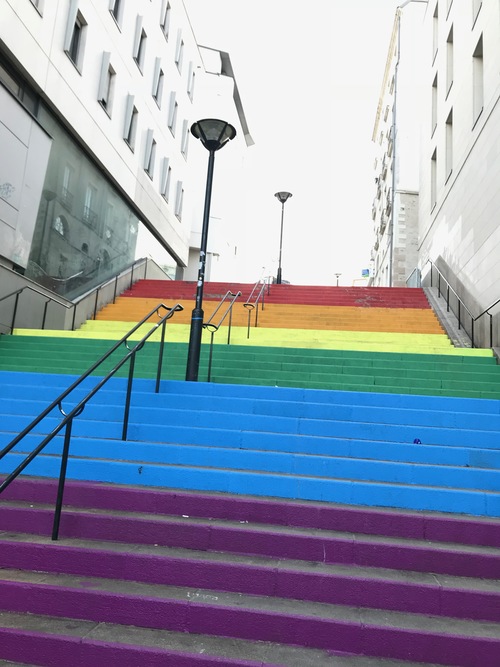Presentation of the symposium
Queering the City : A Transatlantic Perspective
June 10,11, 12, 2021
Fondation des États-Unis – Online
https://henalex.zoom.us/meeting/register/tZclc-ygpjsvGt0KA1jIrOP_HYiLO14zvq0Q
The program and abstracts can be browsed as a whole, by day, or by speaker.
Registrations are open; please sign up by clicking on the "Registration" tab and follow instructions.
For the drag-king workshop which will be limited to a small group of people, you can already register by sending an email to Claire Finch.
The aim of this 3-day symposium is to question the relationships between gender, sex, race, ability and space. If space is the result of social interaction, rather than the mere receptacle of social forces, then according to the trilogy put forward by Henri Lefebvre of "lived, conceived and perceived spaces", it structures and contributes to the reproduction and challenge of social relationships. In an urban sphere characterized by dominations, is it possible to resist and "queer" the city ? If we understand "queer" along the lines of Kath Brown [1], "which operates beyond powers and controls ensuring the respect of normativity," then "queering the city" means redesigning, reconceptualizing, rethinking and remapping spaces and geographies to transform bodies.
As a locus of power, the city is also a counterhegemonic space. The existence of social movements and resistance strategies to dominations of class, gender and race in the contemporary city is not new, whether in the United States or in France. In the last twenty years, feminist, queer, and trans movements have tried to question the "local gender systems and their constituent, culturally, constructed gender contracts which together constitute gendered governance," [2]. Associations, communities but also artists have tried to deconstruct the stereotypes tied to gender and sexuality in the space of cities, in Europe and the United States. However, the efforts to appropriate the territory of women, LGBTQI+ people, racialized people, disabled people, are often neutralized by media coverage and local authorities. We will question the link between existing resistance strategies to norms and the creation of territories in a Transatlantic perspective. Does the resistance and efforts to transform / degender / queer the city enable minorities to reappropriate urban spaces? Is there a creation of territory inherent to these strategies?
This confernce will interrogate the creation of space through social movements, gentrification or identity politics, in France and in the United States. It will address the creation of territory and its intersectional limits (gender, race, ability...). Because the body is also a place and a performance in the space of the American city, we will consider the strategies of "performance" in the city, using the theatricality of space. What are the effects of transgressive art which uses the body to debunk social pre-established codes? How do they manage to "queer" the city, to transform it and blur the boundaries of gender? "Queering" the city requires both transformations of space and language, of the narrative of the city, because both language and space have been interlocked in the construction of the city as androcentric, cisgendered and ableist. Dissenters have often been excluded or partially erased from these moments in history.
The transdisciplinary nature of this academic event will be expressed in the variety of theoretical fields as well as in the integration of artistic practice. With the contemporary rise in power of struggling movements against normativity, sexism, violence towards women and other people resisting the norms of gender and sexuality, discussions will engage with current politics. Keynotes by specialists of queer spaces and geographies of resistance, and performance by contemporary artists, will center on the body as sexed, gendered, racialized, marked by class and ability, in its power to provoke a transformation of the values and norms it refuses to adapt to.

[1] Kath Browne, “Challenging queer geographies”. Antipode 38, p.885–93, 2006.
[2] Helen Jarvis, Paula Kantor, Jonathan Clarke, Cities and Gender, London and New York, Routledge, 2009, p.223
